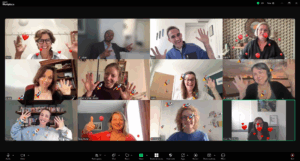Skilful Conflict Resolution: Navigating Turbulence for Business Success
Leading teams using team coaching tools and skills to effectively navigate conflict to resolution…
Unresolved conflicts in a business and team can result in decreased productivity, increased turnover, missed opportunities for innovation, and potential damage to the business’s reputation.
Lack of resolution and ongoing tension on the team often leads to animosity, resentment, and a breakdown of trust. It is essential for leaders to proactively address and resolve conflicts to mitigate these negative impacts.
Being equipped with the tools and skills involved in our team coaching methodology (ORSC), leaders will have the crucial training needed, as well as the understanding of relationship systems, to facilitate conflict resolution within their teams.
Here are some ways leading teams using coaching tools and skills can impact conflict resolution:
Creating a Safe Space
When conflicts are properly addressed, team members feel valued, heard, and supported. This contributes to a positive work environment that fosters employee engagement, loyalty, and overall well-being. Leaders need to establish a safe and supportive environment where team members feel comfortable expressing their concerns and conflicts. This promotes open communication, active listening, and respect for different perspectives within the team.
Facilitating Dialogue
Conflict resolution often involves improving communication patterns within a team. Through the resolution process, team members learn to express their ideas, concerns, and feedback more effectively. This leads to clearer and more constructive communication, reducing misunderstandings, and promoting a culture of transparency and trust. This takes skilful facilitation to create a constructive dialogue among team members involved in the conflict. Leaders must ensure that everyone gets an opportunity to express their thoughts and feelings while maintaining a balanced and respectful conversation.
Active Listening
Leaders need to actively listen to the concerns of each team member involved in the conflict without bias. One of the key principles of our methodology is “Everyone is right, only partially.” This principle exercise demonstrates how different perspectives have an influence on the team’s relationship. By demonstrating empathy and understanding, this style of leadership will encourage individuals to share their experiences and viewpoints without fear of judgment.
Identifying Underlying Issues
Conflicts often arise due to differing opinions, perspectives, and approaches. Exercises using Team Coaching Tools help uncover the underlying causes of the conflict. Leaders are able to delve deeper into the situation, asking probing questions and encouraging self-reflection to identify the conflict’s root causes and potential triggers. When conflicts are addressed and resolved, team members are encouraged to openly share their viewpoints and engage in constructive discussions. This diversity of ideas can lead to more robust decision-making processes, as it allows for a comprehensive analysis of options and consideration of different angles.
Better Relationships
Conflict resolution helps build healthier relationships among team members. When conflicts are resolved in a fair and respectful manner, individuals are more likely to develop empathy, understanding, and stronger connections. Skilfully trained leaders will facilitate a more empathetic and compassionate approach to resolving the conflict. Positive relationships contribute to a positive team dynamic and create a supportive environment for collaboration and innovation.
Generating Solutions
Team Coaching methodology teaches leaders to guide teams in brainstorming and generating potential solutions to address the conflict. This tactic stimulates innovative thinking and creative problem-solving. When team members with different perspectives come together to address conflicts, they are often forced to think outside the box, challenge assumptions, and seek novel solutions. Resolving conflicts effectively can foster a culture of innovation, where new ideas are welcomed and embraced.
Mediating and Negotiating
In situations where the conflict becomes highly escalated or the team struggles to find common ground, Team Coaching tools and skills prepare leaders to be able to take on a more active role as a mediator. This allows leaders to facilitate negotiations, ensuring that discussions remain focused, respectful, and solution-oriented.
Supporting Agreement and Accountability
Once a resolution is reached, a leader can assist the team in documenting the agreed-upon solutions and action steps. By helping to establish and reinforce clear expectations, roles, and responsibilities for each team member involved in the conflict, accountability is ensured moving forward.
Follow-Up and Continuous Improvement
Impactful conflict resolution doesn’t stop at the agreed resolution. It involves monitoring the progress of the resolution and providing ongoing support as needed. It’s vital to know how to conduct follow-up sessions to check in on the team’s dynamics, address any remaining concerns, and facilitate continuous improvement in communication and collaboration.
Overall, Team Coaching equips leaders to act as a neutral and skilled facilitator, guiding their team members through a conflict-resolution process and fostering a positive team environment based on trust, understanding, and effective communication.
If you’re a business leader, a team leader, a manager or someone who works within a team and would like to learn how to better handle conflict, we’d love to connect and have a conversation about how our training can support you.
Dates for introductory courses in 2023 are below, you can register here.
- Fundamentals 8 | 9 September 2023 Virtual
- Fundamentals 12 | 13 October 2023 Virtual
- Fundamentals 26 | 27 October 2023 In-Person, London
- ORS@Work 17|18 November 2023 Virtual






